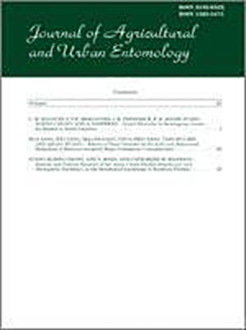The khapra beetle, Trogoderma granarium Everts (Coleoptera: Dermestidae), is an important pest of stored wheat worldwide. Nanoparticles have become one of the most promising new tools for insect pest management in recent years. This laboratory study was conducted to evaluate the insecticidal efficacy of three commercially available nanoparticles [silicon oxide (SNPs), aluminium oxide (ANPs) and zinc oxide (ZNPs)] against T. granarium at 50, 100 and 200 mg kg–1. The efficacy of SNPs, ANPs and ZNPs on wheat, barley, rice, white maize and yellow maize was assessed after 1, 3, 5 and 7 d of exposure. Corrected mortality of T. granarium was significantly affected by nanoparticle types, application rates, grain types, and the insect developmental stages. SNPs and ANPs were more effective than ZNPs, where 100% mortality of second instars was obtained at the highest concentration. Mortality of second instars on wheat treated with SNPs, ANPs or ZNPs at the rate of 200 mg kg–1 was significantly higher than other concentrations. Insecticidal efficacy of all nanoparticles at the rate of 200 mg kg–1 against second instars was significantly higher on barley and wheat than those on rice and maize. First, second and third instars exposed to all nanoparticle types at the rate of 200 mg kg–1 were more susceptible than fourth and fifth instars and adults. Female adults exposed to wheat treated with all nanoparticles at the rate of 200 mg kg–1 stopped reproduction completely. The results demonstrate that commercially available SNPs and ANPs can be used as eco-friendly management strategy of T. granarium; however, further studies under commercial storage conditions are required.
How to translate text using browser tools
8 July 2020
Insecticidal Efficacy of Three Nanoparticles for the Control of Khapra Beetle (Trogoderma granarium) on Different Grains
Ghadeer G. Raduw,
Akram A. Mohammed
ACCESS THE FULL ARTICLE
It is not available for individual sale.
This article is only available to subscribers.
It is not available for individual sale.
It is not available for individual sale.
aluminium oxide
cereal
insect developmental stage
Silicon oxide
zinc oxide





